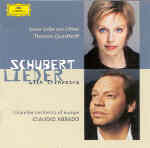It’s not often that accompaniment takes center stage in a recital of Schubert lieder, especially with a duo of A-list soloists heading the bill. In these rarely-performed orchestral arrangements of several of Schubert’s better-known songs, you cannot help but be more alert to the ways in which the likes of Brahms, Reger, Webern, and others tackle music already so perfectly rendered on the “lowly” piano. Anyone hoping for radical “re-imaginings” will be disappointed, for what is mostly remarkable about these orchestrations is just how subdued and restrained they are. Even Berlioz’s take on “Erlkönig” is dismayingly faithful to the original with hardly any of the pyrotechnics we might expect from a composer who had just finished Les Troyens. But Schubert himself sets the stage at the very beginning of this disc with his own unfussy arrangement of “Romanze” from Rosamunde that depends on nothing more than slight emphasis in the strings to amplify the words.
Perhaps out of veneration for Schubert–or just owing to good taste–these composers largely rely on suggestive orchestral effects to bring out the textual elements. Brahms generally opts for light textures and sparse instrumentation. For instance, in “Geheimes”, one of the program’s encores, Brahms scores for just strings (no basses) and one horn. Likewise, he employs only four horns and three bassoons (no strings) to evoke the hunting imagery in “Ellens Zweiter Gesang”. Similarly, Reger brings out the ominous foreshadowing of Gretchen’s ill-fated love with tactile strokes of the timpani in “Gretchen am Spinnrade”. For his part, in “Die junge Nonne” Liszt powerfully calls to mind the stormy passions of a young girl, employing swelling crescendos in the strings and ardent insistence in the basses, while the “peace” she finds when she discovers religion is gently intoned in bell-like notes for flutes and harp.
At the more conventional end is (surprise!) Webern, who at age 20 composed his arrangements as study exercises. Models of discretion, they feature ample doubling of the voices through solo wind passages and are astonishingly beautiful in their simplicity, especially “Du bist die Ruh”. Reger’s contributions are more lavish, with thicker orchestration, a propensity for voice-doubling, and the occasional flourish, such as in the big trumpet fanfares toward the end of “An Schwager Kronos” and the prominent brass in “Prometheus”.
Nevertheless, we’re talking about lieder here, and as such, attention ultimately must focus on the singing–which is predictably first-rate. Experienced Schubertians Anne Sofie von Otter and Thomas Quasthoff split the program, which was recorded live at the Cité de la musique in Paris in May, 2002. Both singers offer strongly characterized and vivid realizations of these works (check out the pair of “Erlkönigs” for some decent “acting” as well), most likely a consequence of the heightened circumstances of a live event. This is a highly recommended disc, particularly for curious Schubert-lovers.
































